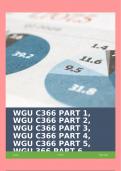WGU C366 PART 1,
WGU C366 PART 2,
WGU C366 PART 3,
WGU C366 PART 4,
WGU C366 PART 5,
WGU
Evatee
366 PART 6
9/9/24 WGU C366
,WGU C366 PART 1, WGU C366 PART 2, WGU
C366 PART 3, WGU C366 PART 4, WGU C366
PART 5, WGU 366 PART 6
textbase Answer - a relatively literal understanding of the text
Summarizing while reading Answer - is a good way to check understanding.
Metacognitive-Strategies Answer - help readers monitor and repair
comprehension. Self-questioning, predicting-confirming, clarifying, rereading,
summarize
Mental Model-Strategies Answer - help readers relate text ideas to previous
knowledge Predicting, Making inferences, making connections, self-questioning
Textbase Strategies Answer - help readers relate ideas to each other:
Anaphoric relationships, Retelling, Summarizing, narrative structure, expository
text structure
Piaget 4 stages of Cognitive Development. Answer - (1) sensorimotor stage,
(2)pre-operational stage (3)Concrete operational stage (4) formal operational
stage
sensorimotor stage (Piaget) Answer - 0-2yrs, child explores world thru his
senses: taste, touch, sight, sound, & smell. Will develop awareness that things
& people exist even when child is not there.
,pre-operational stage (Piaget) Answer - (2-7 yrs)occurs when child begins &
continues to develop language & thinking skills, Focused on self & how world
relates to self
Concrete operational stage (Piaget) Answer - (7-11) Child begins to see world
in relation to others, not just self. Children also begin to develop logical
thinking
formal operational stage (Piaget) Answer - (12-adult) Develop logical AND
abstract thinking. Thought process is ever changing.
Example of discovery learning Answer - Mrs. Jones begins her science lesson
with a problem that her students must solve on their own.
One limitation of Constructivism is Answer - tends to be more time consuming
for teachers and students
negative transfer Answer - Type of transfer where one's prior learning
interferes w/ subsequent learning is called
Low-road transfer Answer - type of transfer that leads to automatic application
of learned skill
General Transfer Answer - Children who are able to use knowledge of subject
to understand another
phonological component Answer - involves rules for combining sounds.
Speakers of English, for example, know that English word can end, but not
begin, w/ an -ng sound.
, Children say their first words between Answer - 12 & 18 months of age.
Children begin to use complex sentences by the age of Answer - 4 years to 4
1/2
Emergent Readers Answer - beginning reader, basic concepts of print, can,
uses picture analysis, attention on letter-sound recognition.
Early Readers Answer - Word recognition strategies, sight words, print reading,
gradual speed in reading
Transitional readers Answer - towards fluency reading, reading lengthy text,
little reliance on pics
Self-extending reader Answer - is independent reader, can read various types
of text, also reads for info.
Stages of Literacy development Answer - Stage 0: Foundation for Literacy,
Stage 1: Beginning Literacy, Stage 2: Consolidation / Fluency, Stage 3: Literacy
for Growth
Foundation for Literacy Answer - Prepare for reading & writing thru shared
book experiences designed to facilitate children's understanding of connections
b/t oral language & print.
Beginning Literacy Answer - Start ACTUAL reading & writing, NOT just learning
about it. Sometimes using "inventive spellings" & read back what have written.




